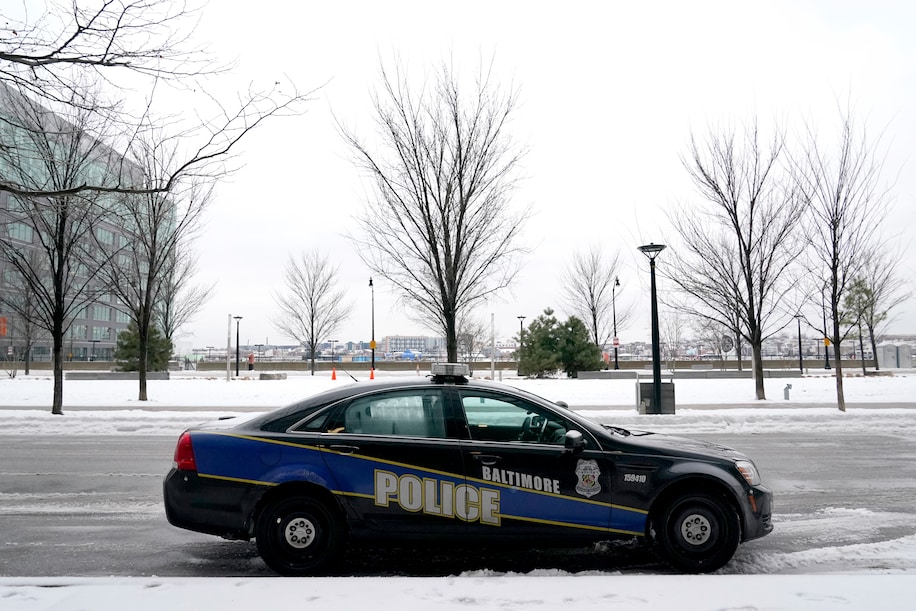
A Baltimore police cruiser. (Julio Cortez/Associated Press)
Hogan’s crime plan isn’t a silver bullet, but it would stem the bloodshed
Originally published in the Washington Post
Last month in his final State of the State address, Maryland Gov. Larry Hogan (R) implored the state legislature to act on his crime bills, saying, “Baltimore City will not ever get control of the violence if they can’t arrest more, prosecute more and sentence more of the most violent criminals to get them off the streets.”
Hogan’s right. Holding criminals and public officials accountable matters. I saw it up close while serving in leadership of the Baltimore and Prince George’s County police departments. The governor’s plan may not be a panacea, but accountability is a necessary precondition for any strategy to be effective in combatting Maryland’s violent crime crisis
Though Charm City recorded 338 killings in 2021 — ranking among the world’s deadliest cities by population — it is not just Baltimore that is being ravaged by violence.
Prince George’s and Montgomery counties also saw violence skyrocket over the past two years. Last year, Prince George’s County saw its most homicides since 2007, and Montgomery County its highest figure in two decades. Murders in both counties more than doubled from 2019 totals.
Meanwhile, aggravated assaults (which include nonfatal shootings) jumped more than 20 percent in those two suburban counties. Carjackings and robberies are up as well.
This violence must stop. Our elected leaders have an obligation to make Marylanders safe in our homes and on our streets.
To fulfill their duty, Annapolis must pass Hogan’s “accountability” legislation to enhance penalties for gun offenders (the Violent Firearms Offenders Act) and bring prosecutorial and judicial decisions into public view (the Judicial Transparency Act).
It’s not the everyday residents of these violence-wracked communities (99.9 percent of them are of decent, hard-working people) who are dangerous but a tiny violent fraction of offenders who carry guns, deal drugs and fight over turf.
In Baltimore, almost every murder suspect has a long criminal history but managed to avoid serious consequences.
Over Baltimore’s past seven bloody years, 48 percent of known homicide suspects have prior violent crime arrests, and 42 percent faced previous gun charges, according to Baltimore police data.
Those gun crimes, which include the use of a weapon in a violent crime and illegal firearm possession by a felon, are strong predictors of future violence. Tomorrow’s killers are today’s gun-toting drug dealers and robbers.
But gun offenders rarely face consequences, and, when they do, see very little to no jail time.
While I served as deputy commissioner of the Baltimore Police, the Baltimore Sun found in 2016 and 2017 that 43 percent of those convicted of a gun crime received less than a year in jail, and half had 50 percent or more of their sentence suspended. The average sentence, according to State’s Attorney Marilyn Mosby, was 16 months. Police data showed it to be less than six months.
According to a 2020 report by the Maryland Public Policy Institute, Mosby’s office dismissed more than a third of illegal gun cases in 2018 and lost, deferred or pleaded down the charges in another 50 percent of cases. Meanwhile, across Maryland, fewer than 10 percent of illegal gun charges in 2019 resulted in a prison sentence.
That lack of accountability for offenders is precisely why Hogan’s firearms bill is needed. Similarly, the public needs to know how courts and prosecutors are prosecuting these crimes. They deserve to see how justice is being done — if it is at all.
Appeals and criminal court judges stand for election after their initial appointment by the governor and can run again after their term expires. The public deserves to know how they are doing. If something is amiss in the courts, the public, the legislature and the governor can act, but they are paralyzed by the darkness shrouding the justice system’s performance.
If we want to stem the violence, getting violent, inveterate “trigger-pullers” off the streets immediately should be our highest priority. Hogan’s bill to expand the list of crimes that carry stiff sentences and make offenders ineligible for bail release will make offenders truly accountable and save lives. As important, we need to hold those charged with enforcing those laws accountable as well through court and prosecutorial transparency.
These bills won’t save Maryland’s crime-ravaged communities overnight, but they will save lives on our streets.
Jason Johnson was deputy commissioner of the Baltimore Police Department from 2016 to 2018 and served with the Prince George’s County Police for more than two decades. He is the president of the Law Enforcement Legal Defense Fund.





